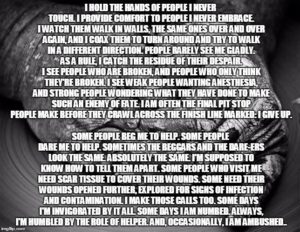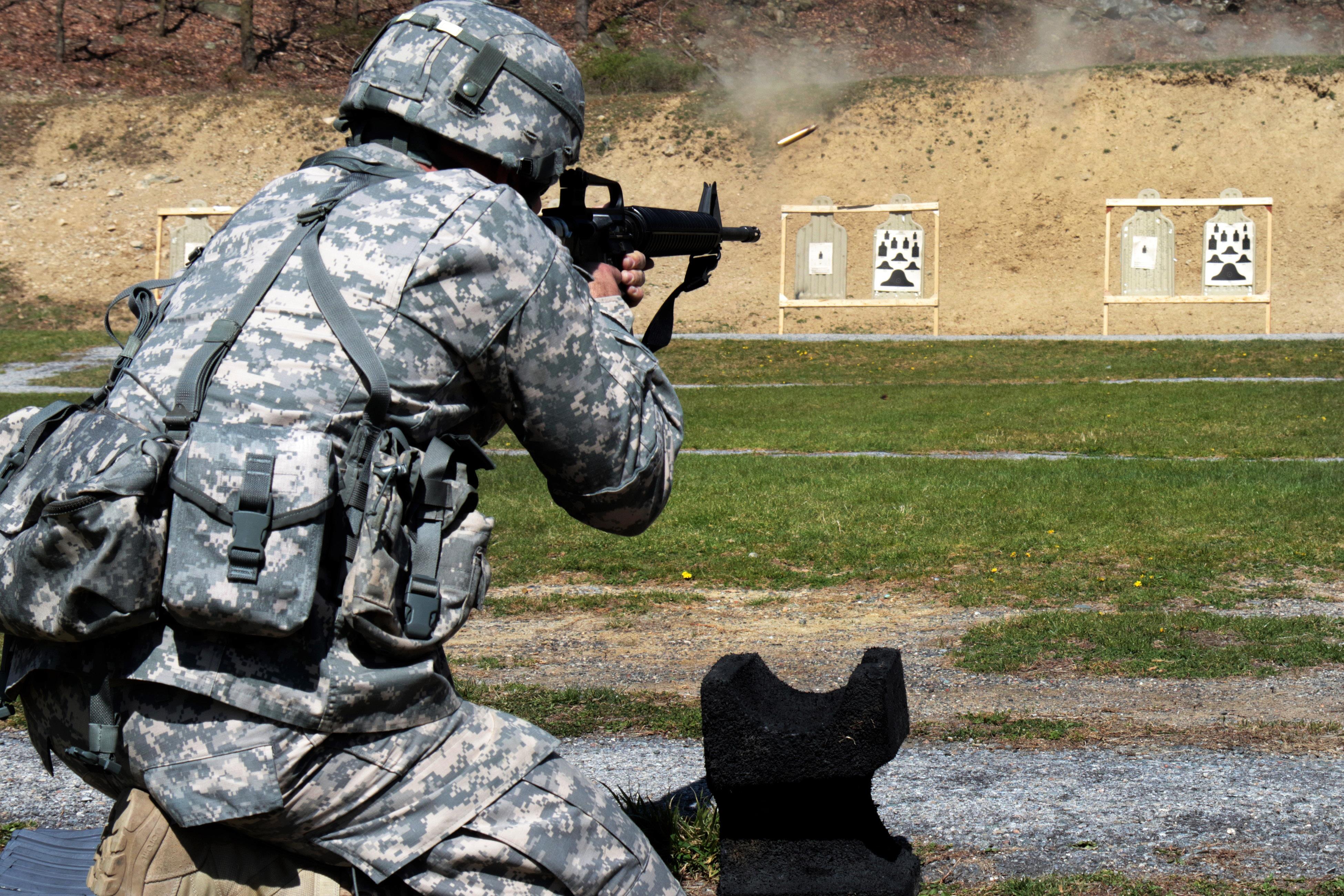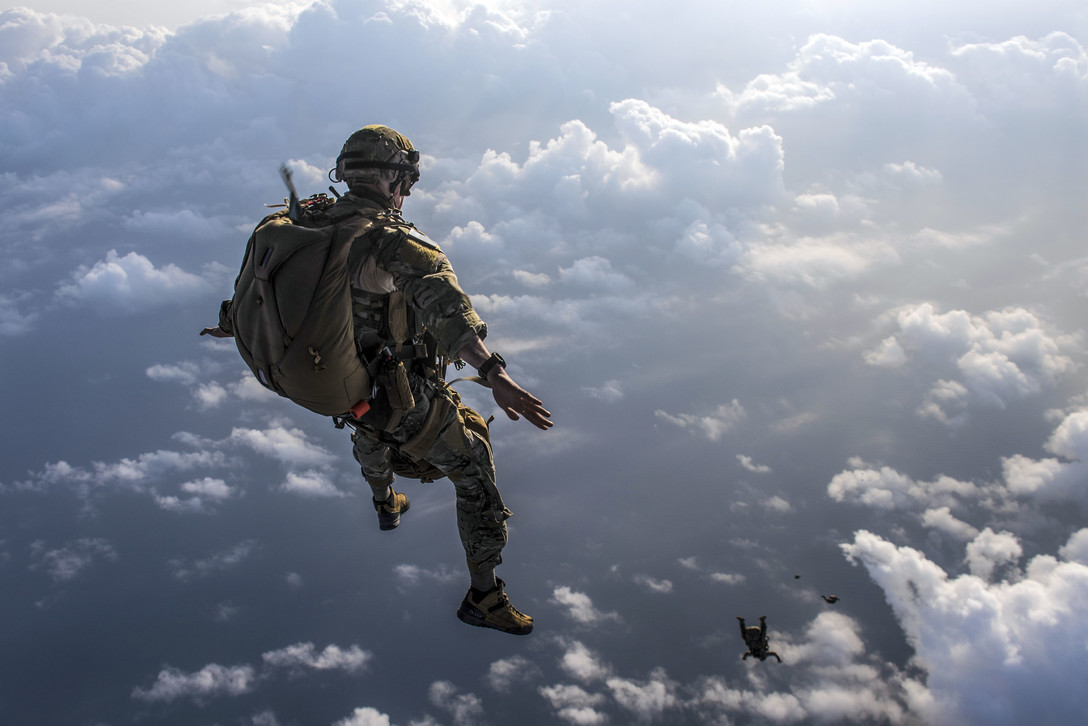
A friend forwarded me this quote the other day. It’s from the book Critical Conditions, by Stephen White. I haven’t read it before, but once I did, I understood it. The veterans and military spouses I work with offer me their time, their thoughts, their greatest hopes and their deepest fears, and I honor it.
I thought I would share some of my thoughts on this.
I watch people walk into brick walls, the same ones over and over again,
And I coax them to turn around and try to walk in a different direction.
We all know Einstein’s definition of insanity: doing the same thing over and over again, and expecting a different result. I see strong, proud people who seem to be tripped up by the smallest hurdle, or confused, angry people who can’t understand why they’ve hit a dead end. My job, as a counselor, is to help veterans understand where they went wrong. To help them understand that there’s a different way, a way that can help them find peace and an end to running into walls.
People rarely see me gladly. As a rule, I catch the residue of their despair.
When a veteran first comes to see me, it’s because things have gone off the rails. Maybe they’re told to come see me, by a family member or the courts. Maybe they’ve finally reached the tipping point of their frustration, and think they have no where else to turn. I welcome their skepticism, their mistrust, because I’m confident that I can show them a part of themselves that they don’t understand. The word “catch,” here, as in a vessel, I give them room in which to contain their grief. Their rage. Their misunderstanding.
I am often the final pit stop people take before they crawl across the finish line that is marked: I give up
There are two ways out of this pit stop. The long way, which is life, and could be a life of peace and wellness, or the painful way. Painful to the veteran, painful to those who care for them. It’s not a place of desperation, but a hopeful refuge, a paradox that contains all hope and no hope in the same thought. It’s the fork in the road, the ultimate decision point, where we can choose to grow, maintain, or decline. It could be the delineating point in a veteran’s life, when they finally stopped, set down their burden and said, “THIS is what I’m carrying. Will you help me understand?”
Some people beg me to help. Some people dare me to help.
Talking to a veteran online recently, and he said a phrase that has stuck with me: “Kicking down doors is a heck of a lot easier than talking about kicking down doors.” And this came from a veteran who did both, and knows what he’s talking about. For many veterans, the chip on our shoulders is the size of a city, or a valley, or an entire nation. We carry the burden of grief, of pride, of honor, and shame, and dare someone to try to figure out what to do with it. I have seen veterans who come to me in pain, but bare their teeth and growl in the same manner that a wolf would when their leg is caught in a trap. And I put up with the growl, the teeth, the anger, the pain.
Some people who visit me need scar tissue to cover their wounds. Some people who visit me need their wounds opened further, explored for signs of infection and contamination.
I’ve met veterans whose wounds have not been allowed to heal, years and sometimes decades after being hurt. They’ve not wanted them to heal, not allowed anyone to approach, until the pain and the wound become part of who they are and what they do. They long for a time before the wound, while also not wanting to give up the part of themselves that is wounded. Sometimes, the wound has healed, but healed imperfectly, like a broken bone that was improperly set. In those times, after trust and legitimacy has been established, we explore the wound together. And continue to work through the pain.
Always, I’m humbled by the role of helper.
And, occasionally, I’m ambushed.
I’m often caught by surprise at the depth and breadth of emotion. Of the seriousness of it all. I’m ambushed by my own thoughts, by the weight of the responsibility that someone has trusted me with. I am always appreciative of the fact that I, and others like me, are trusted with some of the deepest secrets of the strongest people I’ve ever had the honor to know.
And I’m thankful for those who have chosen to support me.

The Head Space and Timing Blog is supported by the Colorado Veterans Health and Wellness Agency, a 501(c)3 Nonprofit in Colorado Springs, Colorado. The goal of the CVHWA is to provide military culturally competent mental health counseling to veterans and their spouses, regardless of characterization of discharge, time of service, or era of service. Our vision is to assist veterans to identify and remove barriers to their mental, physical, emotional, and behavioral wellness. For questions or inquiries, contact us!


